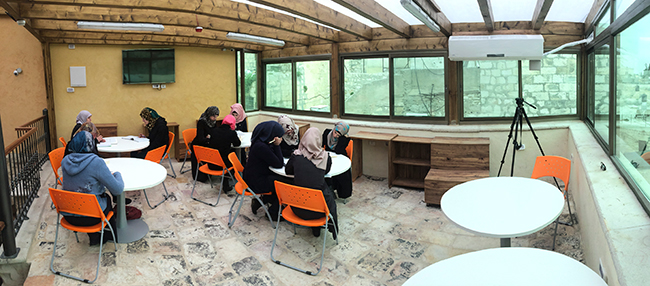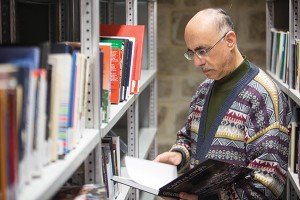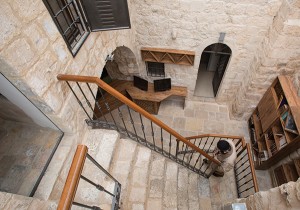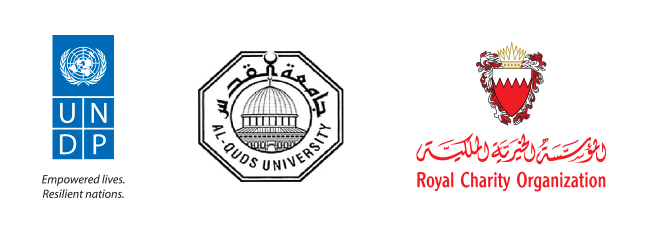
Since 1967 not one Palestinian public library has been established in Jerusalem. However, there are many private library initiatives alongside school and university libraries, and there are at least four specialized private libraries that are not open to the public.
After almost 50 years of longing for a public library in Jerusalem, Palestinians can now benefit from the newly established Al-Quds University Public Library (AQUPL), created through generous funding from the Royal Charity Organization of the Kingdom of Bahrain and implementation expertise from our partner, UNDP Programme of Assistance to the Palestinian People.
♦ The establishment of a Jerusalem public library project funded by the Royal Charity Organization – Kingdom of Bahrain and implemented by UNDP’s Programme of Assistance to the Palestinian People. The Project is part of the FAIR programme.
AQUPL has an overall objective to reinforce the cultural role in Jerusalem by contributing towards the promotion of the Palestinian national identity through the establishment and operation of this public library. AQUPL is a three-level historical building located at Aqbat Rasas St. inside the Old City walls and only a two-minute walk from Damascus Gate. The building was restored and rehabilitated by UNDP to be used as a public library.
It is equipped with the most up-to-date computer hardware placed in a multipurpose room, as well as a quiet reading room and a cafeteria with a terrace overlooking the Old City of Jerusalem. AQUPL will be open to everyone by the end of March 2015 (Saturday to Wednesday 8:00 a.m. to 5:00 p.m.).

Al Quds University Public Library aims to contribute towards raising awareness, spreading knowledge, supporting the cultural sector, and strengthening the resilience of the local community of Jerusalem. Therefore, AQUPL will make its resources and services available to Palestinians living in the Old City of Jerusalem, and the local population at large – pupils, students, teachers, children, researchers, professors, journalists, professional associations, visiting researchers, graduates, and other off-campus users – by providing the population with restored public spaces, a variety of book collections, digital information resources, and support for accessing the best learning tools available.
The public library has the capacity to absorb around 10,000 books and will initially house approximately 3,000 books. Almost 1,000 of them are specialized books that focus on Jerusalem’s history, archeology, and contemporary issues. The great team of librarians at Hind Husseini College Library, who are professional in indexing and cataloging the new books, are in the process of indexing and cataloging this huge number of books to be ready for the upcoming inauguration in March. Some of them will be working in the new public library too.
In addition to this large collection of books in printed formats, AQUPL will offer a wide scope of e-books and a specialized form of electronic scientific documents that are just as important as hard-copy books. Their purpose is to provide material for academic research and study, and they are formatted similarly to articles in traditional printed journals. Since most commercial journals are subscription-based, or allow pay-per-view access, visitors will have full access to the large existing electronic databases and the newly made available databases through the public library project.

AQUPL’s action plan will include programs and cooperation projects with various institutes that aim to encourage reading. For that purpose, Al-Quds University has endorsed a new, membership-based policy to allow any member to borrow up to two books at a time, which will encourage reading and research for all. In order to enrich the quality of the services provided, Al-Quds University considers its public library to be a space to host a variety of cultural programs that include cultural events, seminars, workshops, research, lectures, and book launches and exhibitions. We have facilitated general access to these databases through an in-house-developed application that is user friendly. In addition, we will soon launch a Web portal that has been developed by our IT specialists in the university to allow access through Internet to the book catalogues (http://aqupl.alquds.edu).
Several activities, including group visits, have been organized in Jerusalem to raise awareness about this new library. Last month the Planning and Development Unit at Al-Quds University organized a workshop that focused on the importance of libraries in Jerusalem as well as on our plans for the AQUPL.
Al-Quds University’s vision is to contribute to the conservation and preservation of cultural identity and national belonging by inspiring knowledge through books and digital information resources. We aim to spread knowledge and support the cultural sector, as well as the educational and social development of Palestinian society as expressed by Dr. Safa Nassereldin, Vice President for Jerusalem Affairs at Al-Quds University. Al-Quds University offers a vibrant learning environment to its students whilst creating a hub for creativity, exchange of ideas, and freedom of expression and innovation of research. Its vision is to continue providing students with the best possible education with the values that make for engaged citizenship, openness to new ideas, cooperative endeavors, and respect for world cultures.
Jerusalem has been deprived of many interventions lately and needs the good will and support of everyone to encourage the steadfastness of its people. Great thanks from us to the Kingdom of Bahrain, UNDP, and all who try their best.
» Omar N. Zaro is the head of the Planning and Development Unit of Al-Quds University, Jerusalem Campus, and has been working at the university since 2011. In 2014, Mr. Zaro earned a master’s degree in international cooperation and development from Bethlehem University. Mr. Zaro lives in the Old City of Jerusalem. He can be reached at ozaro@admin.alquds.edu or pdu.jerusalem@admin.alquds.edu.


